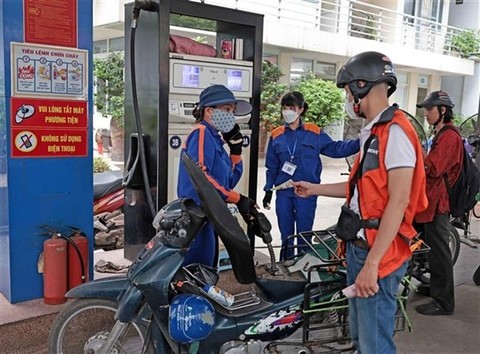
At a Petrolimex petrol retail store in Hà Nội City. Since mid-April, Petrolimex (PLX) and PV Oil (OIL) have seen their shares rise sharply. — VNA/VNS Photo
In less than two months, Petrolimex (PLX) shares have risen by approximately 30 per cent, while PV Oil (OIL) shares have surged by over 50 per cent, reaching their highest levels in more than two years.
At the end of March, the Ministry of Industry and Trade unveiled a draft decree on fuel trading, which is expected to positively support major players in the industry.
It will replace Decree 83/2014/ND-CP and its subsequent amendments and investors were quick to assess the possible impact of the change.
From mid-April, capital rapidly flowed into Petrolimex and PV Oil, driving their stock prices up sharply. According to a recent report by Maybank Investment Bank, the new decree will reinforce the advantages of primary traders, benefiting companies like Petrolimex and PV Oil in terms of market share expansion and profit margins.
The draft decree maintains the rule that only primary traders are permitted to purchase fuel directly from domestic refineries or import it from abroad. The selling prices from these primary traders to distributors and retailers are not legislated but are based on agreements between the parties involved. This effectively allows primary traders to control profit margins within the value chain.
Distributors must buy fuel directly from primary traders and are no longer allowed to cross-purchase from other distributors, which strengthens the position of primary traders like Petrolimex and PV Oil. Additionally, the decree proposes increasing fuel storage requirements from 20 days to 30 days, which will raise business costs but will not affect the competitive advantage of primary traders within the value chain.
Maybank Investment Bank's report emphasises that the new decree will enhance retail price operations and reduce fragmentation, favouring large-scale primary traders. Similarly, ACBS’s recent report highlights several long-term benefits for primary fuel traders like Petrolimex under the new decree. These include the prohibition of distributors buying from each other, reducing intermediary costs and implementing stricter conditions to become a primary trader.
The decree also allows primary traders and distributors to set selling prices, provided they do not exceed the regulated price formula, fostering a competitive environment with reduced state intervention. The maximum business costs and profit margins stipulated in the draft decree are also higher than the current levels.
ACBS believes that with advantages such as the largest fuel storage capacity, strategically located petrol stations and a strong brand, Petrolimex will outperform its competitors. The Vietnamese fuel market currently features over 17,000 retail petrol stations, supplying millions of tonnes of products to consumers annually.
Nearly 70 per cent of domestic fuel revenue is controlled by Petrolimex and PV Oil. Petrolimex leads with a 50 per cent market share and 5,500 outlets nationwide, followed by PV Oil with an 18 per cent market share and 700 outlets. In the first quarter of 2024, Petrolimex and PV Oil’s combined revenue reached nearly US$4.5 billion, the highest since Q2 2022. On average, these two retail giants generate about US$49.5 million daily.
The proposed regulatory changes in fuel trading are anticipated to significantly benefit major companies in the sector, particularly Petrolimex and PV Oil, by solidifying their market positions and enhancing their competitive edge. — VNS